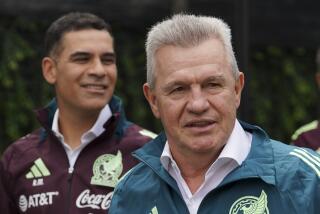Zero’s Welcome for Medal-less
- Share via
MEXICO CITY — As more than 100 defeated Mexican athletes arrived home Tuesday, sports began to imitate life in a nation mired in crisis.
The Mexican Olympic team, with its one bronze medal in Atlanta, was met not by banners and cheers but by clamors for a congressional investigation into Mexico’s worst Olympic showing since 1928.
The team’s return, in fact, unleashed a firestorm of protest. Even lawmakers from the nation’s longtime ruling party joined in the outrage; one charged that Mexico’s Olympic committee and sports commissions are riddled with the same corruption, favoritism and bossism that afflict political institutions here.
“The results in Atlanta are a reflection of what is going on in Mexico right now--a country in crisis, without definition,” said congressman Alejandro Rojas Diaz, a reformer demanding the resignation of Mexico’s long-serving Olympic Committee chairman.
And so it was in other nations that fell short of their Olympic expectations.
A congressional investigation already is under way in Colombia, whose team came home empty-handed. There, amid myriad drug and corruption scandals, legislators said they plan to call for the heads of their sports minister and Olympic committee chief in hearings scheduled to begin next week.
Even in Britain, most of the nation’s 302 athletes streamed home not merely in defeat but in debt and anonymity. They carried only 16 medals--only one gold--in the worst performance by any major European country.
The British, who won 20 medals in Barcelona in 1992, had hoped for 26 this time; they wound up with fewer than the Netherlands. British commentator Nick Mason decried the team’s performance as “a decline of self-flagellating proportions.” Blame was ascribed to a shortage of money, lackluster leadership and government indifference to sports. A British Olympic Assn. survey found that 60% of its athletes were returning in debt.
Said Dee Morgan of her son Robert, who finished 13th for the British in platform diving: “He’s given his life to diving . . . [but] our athletes rely on parents’ handouts and dole money [unemployment benefits].” Added swimming team captain Alan Rapley, who complained that going away to the Games cost him $750 in unemployment benefits: “My biggest concern is how I’m going to pay my rent.”
There were exceptions. Just an island away from Britain’s gloom, a cheering crowd and brass band braved fierce Dublin rains to welcome Irish swimmer Michelle Smith, who brought back three golds and a bronze.
Cuba’s Fidel Castro met his Olympians with bear hugs and praise for their 25 medals. And thousands of South Africans waved and sang Tuesday at Johannesburg’s International Airport for marathon runner Josiah Thugwane, the nation’s first black gold-medal winner, and double gold-medalist swimmer Penny Heyns.
But even in Johannesburg, politics overlapped the joy. Many noted, for example, that Tuesday’s reception eclipsed the protests that met 17 returning South African cabinet officials two weeks before: They reportedly attended Atlanta’s opening ceremonies at government expense. The Citizen, a Johannesburg newspaper, called that journey part of the “overloaded gravy train” and “porcine swilling at the gravy troughs.”
But for Mexicans, the Olympic issue went beyond money. It cut quickly to corruption, power and cultural priorities in a nation living through political and economic convulsions.
The Mexican performance in Atlanta--several athletes had been expected to win medals in boxing and running events--”reflects all the depravity of Mexican politics,” said congressman Diaz, whose Institutional Revolutionary Party, or PRI, has run Mexico with an iron grip for nearly seven decades.
Diaz called for a restructuring of the nation’s sports bureaucracy to mirror sweeping reforms in Mexico’s political system and within Diaz’s own political party. He also said Mario Vazquez Rana, who has chaired the Mexican Olympic Committee for the past 22 years, should resign.
Vazquez, a prominent fixture on the world Olympic scene--he has been tipped as a possible future president of the International Olympic Committee--defended himself against the torrent of charges in an interview Tuesday.
“I know people are blaming me, and to a certain extent the Olympic Committee is responsible,” he said. “But I say that there is no one person guilty. The results can be explained by the sports tradition here in Mexico: Money is not invested in sports to make it a part of the education system, and sports are not practiced from childhood.”
He compared Mexico’s $4 million-a-year international sports budget--a fraction of a cent for each of Mexico’s 90 million people--to that of Italy, where he said the government spends $2.4 billion annually on sports.
“We can compete on a Pan American level, but we just don’t have what it takes to compete on an Olympic level,” Vazquez said. “Mexico is just not a country of medals.”
Times staff writers Bob Drogin in Johannesburg and William Montalbano in London contributed to this story.
More to Read
Go beyond the scoreboard
Get the latest on L.A.'s teams in the daily Sports Report newsletter.
You may occasionally receive promotional content from the Los Angeles Times.






